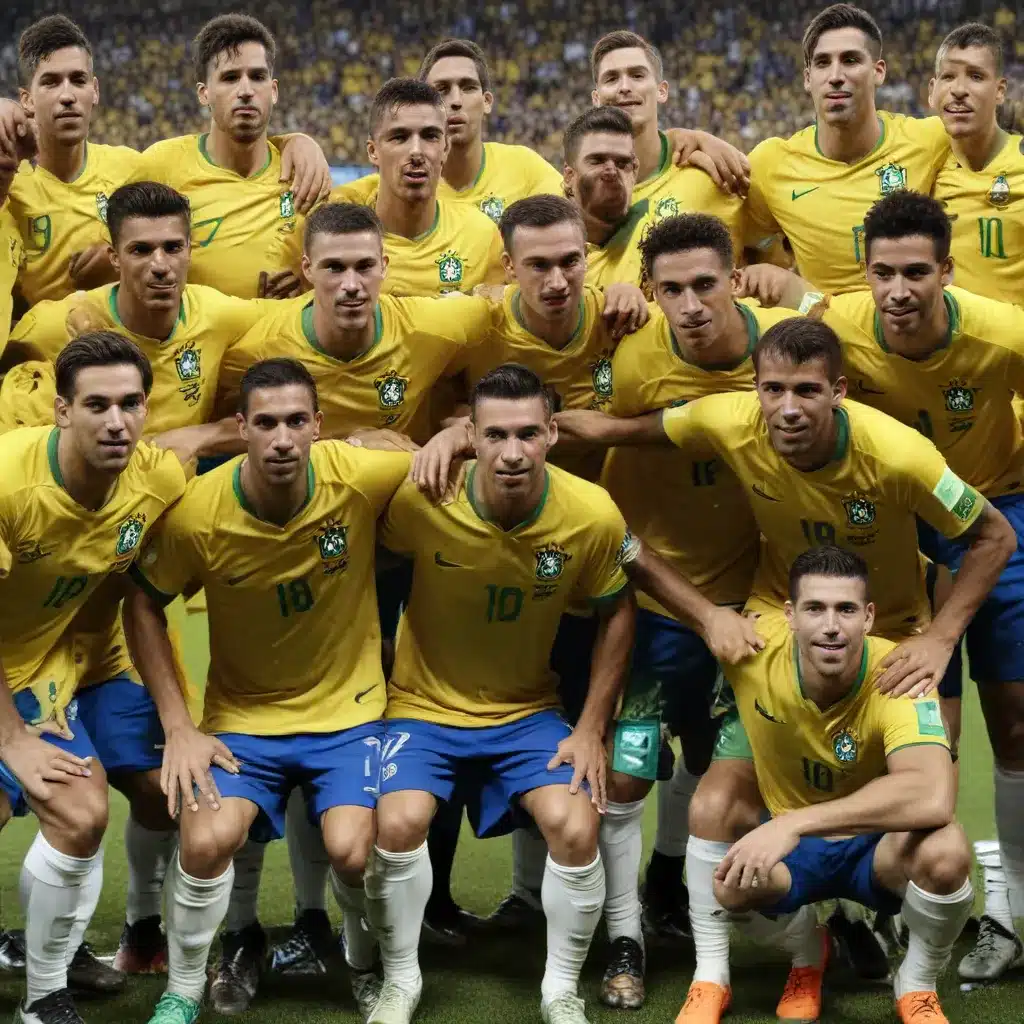
Brazil’s Football Legacy
The Brazil national football team, known affectionately as the Seleção, is one of the most iconic and successful sporting teams in the world. With an unparalleled five World Cup titles to their name, the Brazilians have cemented their place as true giants of the global game. The Seleção’s influence extends far beyond the confines of the pitch, with their distinctive yellow and blue kits, the samba-infused flair of their play, and the passionate devotion of their legion of supporters.
At the heart of Brazil’s football legacy lies a rich tapestry of legendary players who have donned the famous shirt over the decades. From the silky skills of Pelé to the mesmerizing dribbles of Ronaldinho, the Seleção has produced some of the most captivating and revered footballers in history. These icons have not only thrilled audiences worldwide but have also inspired generations of young Brazilians to take up the sport and dream of emulating their heroes.
Brazilian Football Superstars
The Brazil national team has been blessed with an abundance of world-class talent, with players who have transcended the sport and become global icons. Foremost among them is the peerless Pelé, whose exploits during the 1950s, 60s, and 70s cemented his status as arguably the greatest footballer of all time. The three-time World Cup winner (1958, 1962, 1970) captivated audiences with his breathtaking skills, boundless creativity, and unerring eye for goal.
In the modern era, the Seleção has continued to produce a conveyor belt of attacking talent, with the likes of Ronaldo, Ronaldinho, and Neymar leaving an indelible mark on the game. Ronaldo, known as “O Fenômeno,” was a devastating striker who combined power, pace, and clinical finishing to devastating effect, winning two World Cups (1998, 2002) and cementing his place among the all-time greats.
Ronaldinho, with his dazzling dribbling, sublime touch, and infectious smile, enchanted fans worldwide and played a pivotal role in Brazil’s 2002 World Cup triumph. More recently, Neymar has carried the mantle of the nation’s leading light, captivating audiences with his mesmerizing skills and scoring prowess.
Beyond the iconic forwards, Brazil has also produced a rich tapestry of midfield maestros, from the elegant Zico to the tireless Dunga and the visionary Kaká. These midfield generals have been the heartbeat of the Seleção, orchestrating the team’s attacking play and providing the creative spark that has so often led to glory.
Perspectives from Spain
The rivalry between Brazil and Spain, two of the world’s footballing superpowers, has produced some of the most captivating and high-stakes encounters in the sport’s history. As the dominant national team of the current era, Spain has often found itself pitted against the Seleção, with the two sides engaging in tactical and cultural clashes that have captured the imagination of football fans around the globe.
From a tactical perspective, the Brazilians and the Spaniards have often embodied contrasting philosophies. While the Seleção has traditionally favored a more fluid, attacking style that celebrates individual flair and creativity, Spain has become renowned for its possession-based, tiki-taka approach, with the team’s ability to control the tempo of the game and wear down opponents.
This clash of styles has led to some memorable encounters, with the 2013 FIFA Confederations Cup final serving as a prime example. In that match, the Spaniards were overwhelmed by the relentless pressing and counterattacking prowess of the Brazilians, who emerged victorious in a 3-0 rout. The game highlighted the enduring quality and adaptability of the Seleção, who were able to nullify Spain’s trademark possession and expose the weaknesses in their defensive structure.
Beyond the tactical nuances, the rivalry between Brazil and Spain is also shaped by the cultural influences that have shaped the development of the game in both countries. In Spain, football has long been intertwined with the country’s rich history and regional identities, with clubs like Barcelona and Real Madrid serving as powerful symbols of Catalan and Castilian pride, respectively.
In contrast, the Seleção has come to embody the vibrant, diverse, and samba-infused culture of Brazil, with the national team’s success serving as a source of national pride and unity. The infectious rhythms and infectious joy that permeate the Brazilian game have often stood in stark contrast to the more reserved and tactical approach favored by their Spanish counterparts.
The Seleção’s Global Impact
The influence of the Brazil national football team extends far beyond the confines of the pitch, with the Seleção’s global impact manifesting in numerous ways. The team’s iconic kits, featuring the distinctive yellow and blue colors, have become instantly recognizable symbols of the sport, inspiring legions of fans and emulators around the world.
Moreover, the Seleção’s style of play, characterized by its flair, creativity, and attacking prowess, has had a profound impact on the evolution of the game globally. The team’s emphasis on individual skill, improvisation, and the sheer joy of playing has inspired countless players and coaches to embrace a more expressive and entertaining brand of football.
This legacy has been particularly evident in the development of the game in other parts of the world, with the Seleção’s success and cultural resonance serving as a source of inspiration for aspiring footballers and burgeoning football cultures. From the bustling streets of São Paulo to the dusty pitches of Africa, the Seleção’s influence can be seen in the way the game is played and celebrated.
Indeed, the enduring legacy of the Brazil national team lies not only in its unparalleled success on the field but also in its ability to transcend the boundaries of the sport and become a symbol of national identity, cultural expression, and the pure, unadulterated joy of the beautiful game. As the Seleção continues to captivate audiences around the world, its impact on the global landscape of football is sure to endure for generations to come.

